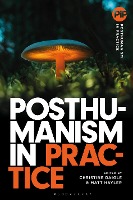Problematic assumptions which see humans as special and easily defined as standing apart from animals, plants, and microbiota, both consciously and unconsciously underpin scientific investigation, arts practice, curation, education, and research across the social sciences and humanities. This is the case particularly in those traditions emerging from European and Enlightenment philosophies. Posthumanism disrupts these traditional humanist outlooks and interrogates their profound shaping of how we see ourselves, our place in the world, and our role in its protection.
In Posthumanism in Practice, artists, researchers, educators, and curators set out how they have developed and responded to posthumanist ideas across their work in the arts, sciences, and humanities, and provide examples and insights to support the exploration of posthumanism in how we can think, create, and live. In capturing these ideas, Posthumanism in Practice shows how posthumanist thought can move beyond theory, inform action, and produce new artefacts, effects, and methods that are more relevant and more useful for the incoming realities for all life in the 21st century.

